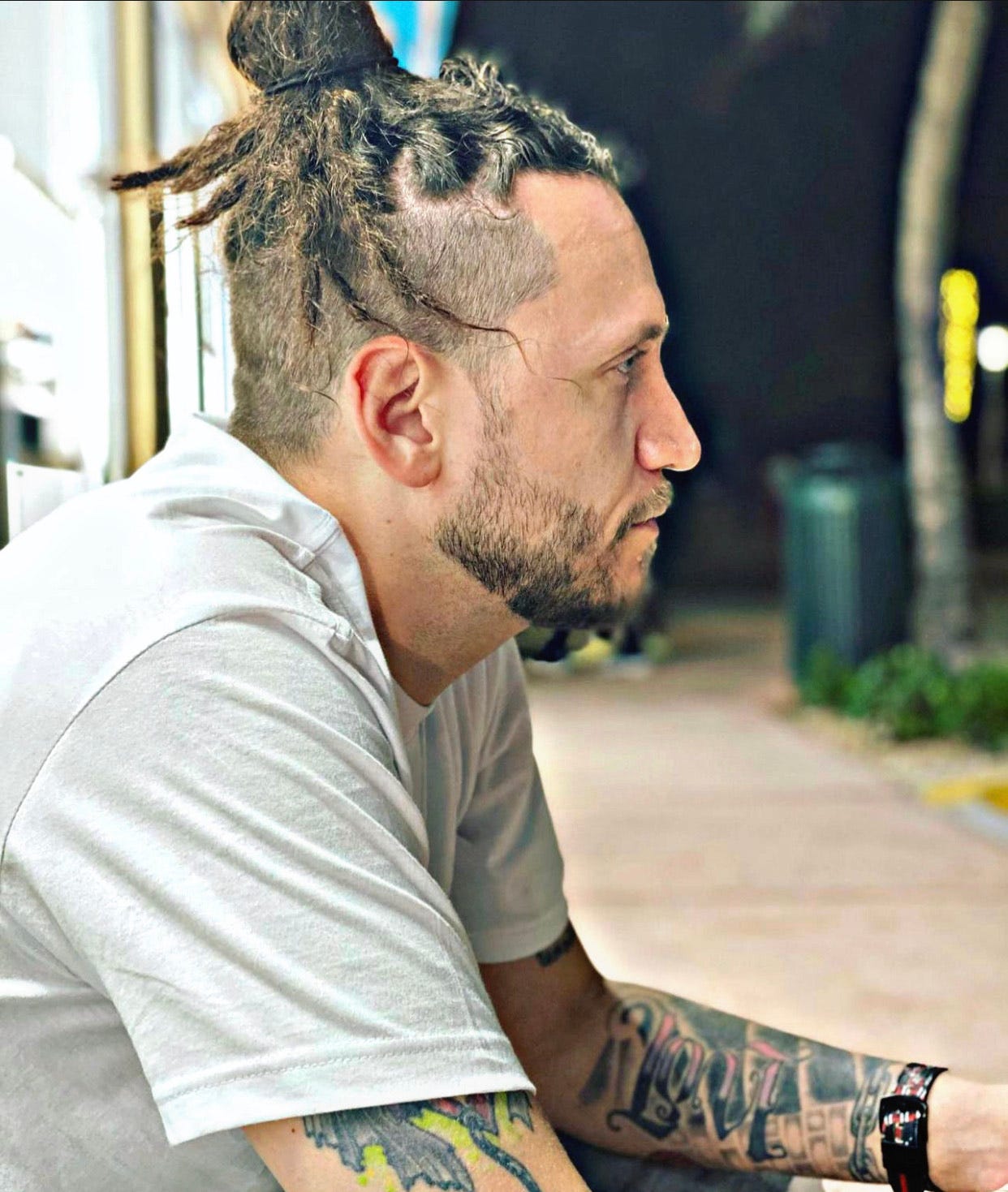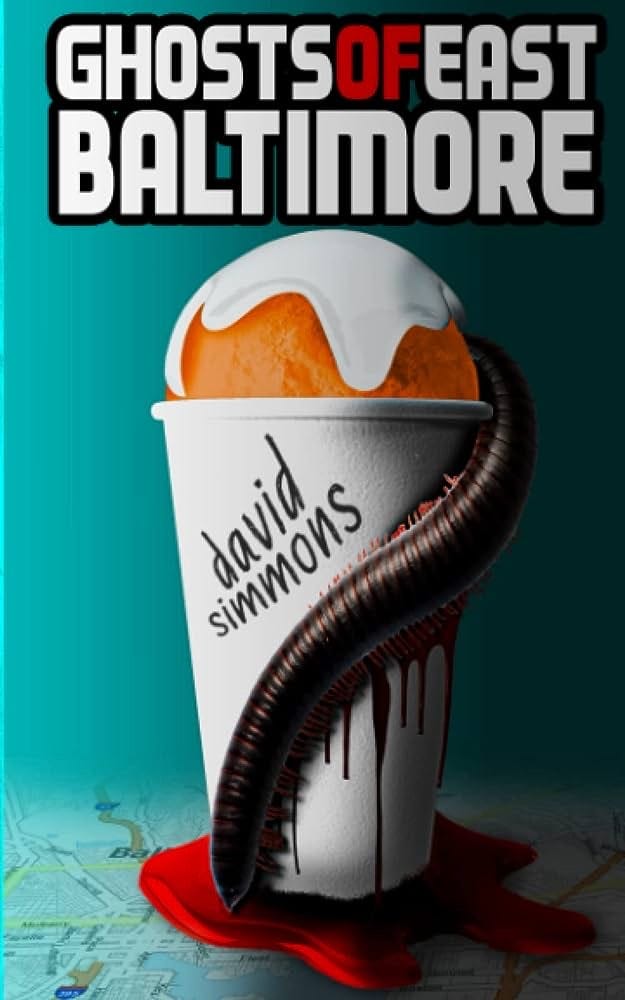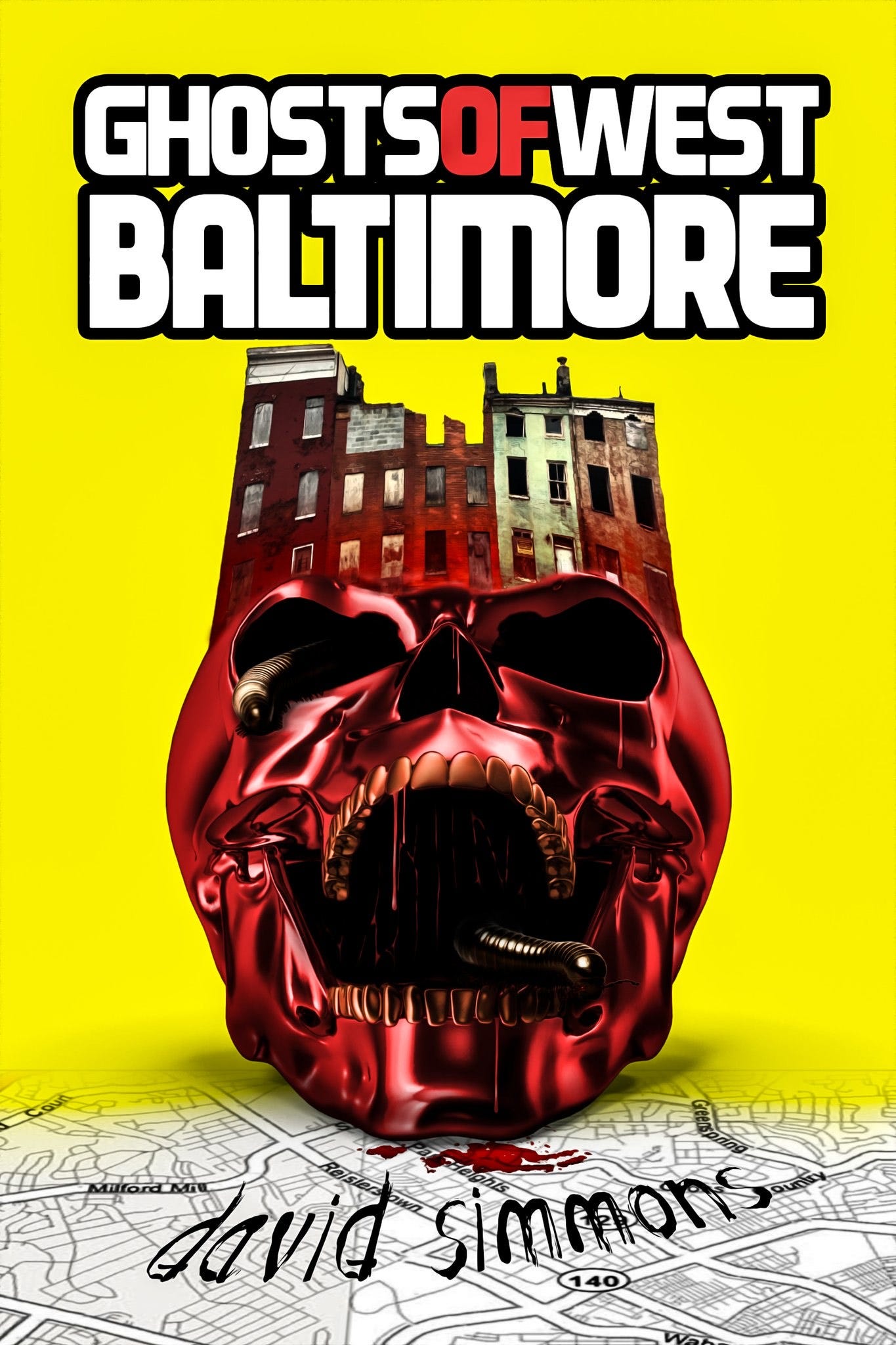An Interview with David Simmons
I discovered David Simmons through my good friend
who was publishing his debut novel. I picked up Ghosts of East Baltimore and was completely floored. One of my favorite novels of 2022. It’s a novel that begins stable and in a way that you think you know where this is all heading. Then it veers off the road and keeps fishtailing wildly until its absolute gobsmacking resolution.His second novel Ghosts of West Baltimore is out today and it keeps getting better.
Ghosts of East Baltimore is one of the wildest novels I've read in years, but it also offers a real examination of Baltimore as a place. What made you want to set this story in Baltimore as opposed to some imaginary city?
Thank you, my boa.
I enjoy writing about wild shit in a grounded environment. I think Baltimore is a very down to earth place. If you work hard and stand on business, you can make it here. People are more accepting of everything. Whether that’s different kinds of people with different views doing different things right next to each other, or just civility. You would not think it because Baltimore gets bad PR but people are very kind and polite here. Ready to help you. It’s a southern hospitality mixed with an east coast directness and clarity. And the book is about trying to help, setting aside yourself for something bigger than you, but also, accepting that some shit is too fucked up to ever fix. The things that happen in my writing are often transgressive and surreal. It’s fun to drop that into a blue collar, down to earth, come as you are environment. I read somewhere that fans of James Joyce can go on Ulysses walking tours in Dublin and get drunk at the bars and shit from the book, I guess?
I want people to love Baltimore in a similar way, so fans of my shit can go on walking or driving tours of the same streets in Ghosts of East Baltimore that the protagonist has to take to complete his journey, if they want to.
You often hear of writers escaping where the lived to go somewhere like New York or LA so I always find it interesting when people remain where they're from. Personally, I think my own writing improved when I began engaging with Minneapolis as a place where things happen rather than a place to escape.
What do you think is the draw of your hometown? On Agitator, you named Baltimore as your favorite city, for example. What is it about Baltimore?
It’s a mysterious place. There’s a sense of something happening in the air always. I love that. There’s a grittiness to it that I appreciate. A realness. There’s art in the architecture and a lot of American history. All of my friends and family are here. My wife and I got married here. My daughter was born here and that’s the most important thing in my life and the best thing to ever happen to me. Everything great has happened in my life in Baltimore.
Also, because Baltimore gets bad PR and has some issues with crime, corporate restaurant chains and businesses don’t wanna build their shit everywhere, so the city isn’t full of the same foods and stores as everywhere else. It’s a lot of locally owned unique places. It makes it so I don’t want to ever leave here because unlike everywhere else, which has been gentrified and changed and no longer looks anything like what it was, there is nowhere else like Baltimore because Baltimore is still Baltimore.
There's a true mixing and mashing of genres in Ghosts of East Baltimore. We have a crime story, a neo-noir mystery, a protagonist so fresh from prison he doesn't have a phone or money, and then, of course, the intrusion of the uncanny and eldritch. In some ways, this reminded me of musicians like Girl Talk, who blend dozens of influences and genres together to make something new. Can you talk a bit about the process of writing this book?
I tell this story all the time when I do interviews, because it’s the truth. I read a short story by J. David Osborne called “Imprinting” where a detective is doing regular crime noir detective shit but then he goes home and we find out he’s getting cucked and after his wife tells him how she enjoyed her affair, he then he takes off his skin and puts on a new skin suit (???) and goes to work at Starbucks (???) as a different person, and when I read that story I felt an excitement for writing that I hadn’t felt before. I didn't know you could write shit like that. So Ghosts of East Baltimore is my journey of realizing I can write whatever genre or style I want as long as it’s good.
People are gonna fuck with it if it's good.
You use drugs not simply as a metaphor for dark forces in the universe, but as their literal delivery system. Was this a conscious decision or something that arose spontaneously while writing?
Yeah, I think drugs were always going to be a delivery system. I am familiar with drugs; the industry of selling them, and using them as well. I like pulling from personal experience because it gives my shit a lived-in feeling. Authentic.
So I knew I wanted to involve drugs in this book, but without making it just another Baltimore drug trafficking story.
Drugs take a backseat in Ghosts of West Baltimore. Instead, our pathway to the uncanny comes through religion. I like that there are multiple pathways to get to the deepdark beyond human understanding. And while Marx said that religion is the opium of the masses, I don't get the sense that you're even really being critical of religion here. So where did this path in Ghosts of West Baltimore come from?
Oh yeah, not at all. Religion is cool for some people and I like to let people do their thing. I felt like there wasn’t much representation in occult horror and cult horror for Judaism. And by cult horror, I mean a story with a cult and a cult leader. There’s so much media with the evil cult leader trope and it’s always Christianity-based messianic shit, or Mormon or whatever. As a Jew, I wanted to have a crazy evil Jewish cult leader. Switch it up a lor bit. You got the movie Pi and the Possession and that's about it for real, as far as Jewish religious horror goes.
As far as a pathway to the uncanny, through my research for this book I learned that Judaism is very esoteric with a lot of magic and supernatural shit. There was so much wild shit there already in my people’s history to just pull from. All I was ever taught about Judaism growing up was the pain part. The how everybody don’t fuck with us part. The perseverance and survive and thrive even though everybody wanna kill us part. That’s it. I ain’t know about all the magic shit. So I really enjoyed learning about the parts I didn't know. Those parts helped me write the book.
Ghosts of West Baltimore is out today. What made you decide to extend Worm's story into another novel?
Baltimore consists of East Side, or Over East, West Side, and South Baltimore. This meant that writing Ghosts of East Baltimore always left room for further expansion into a series. Furthermore, I was not ready to leave the world of Worm and the Antiochians. West Baltimore is very different than Over East. There is a large Jewish community there. I wanted to explore that. The culture is different and the people are too. The accent. I live Over West. My family does. I wanted to play with the West.
Judaism, especially Hasidic Judaism, is front and center in Ghosts of West Baltimore. Many writers have written about or engaged with their Jewishness, but I've never seen it done this way before. How much research went into this?
Look right, both my parents are Jews, I went to Hebrew school and synagogue on holidays and I had a bar mitzvah. I can read Hebrew. But I ain’t know shit about Hasidic Judaism. And I definitely didn't know about kabbalistic Judaism or any of that. And I definitely didn’t know about all the esoterica like the Tetragrammaton and the Sefirot. And I don’t believe shit about shit for real. I knew about the golem because all Jewish kids know about that boa, it's like a cultural fairy tale or whatever. I corresponded with a Lubavitcher for a while working on this book. We still talk. That’s my boa. That’s how I learned how to write like they talk. I live in an area with a big Hasidic community. I spent a lot of time talking to random folks that would talk to me. You can meet people at the kosher grocery store called the 7 Mile Market. The food is great, too.
During my research, I came across a 17th century Sephardic rabbi and mystic named Sabbatai Zevi. This Zevi was a wild boa. He was a rabbi who proclaimed himself the messiah in Smyrna, Turkey. My peoples are from Turkey so I became personally invested. This boa told everybody he could fly but was all like, "nah, I can't show y'all because y'all too unworthy to see that shit." That's hilarious. He kept acting like he was gonna pronounce the Tetragrammaton, which is the real name of God that ain't nobody supposed to say out loud, but then he was like, "haha, gotcha!" and ain't say it. He got kicked out of so many places. For doing fuck shit. He married the Torah. That's some wild shit. Then he was like, "I'm the messiah, so I am going to have to marry an unchaste woman," so he ended up marrying this prostitute that was, like, famous for being unchaste or whatever. Imagine that! To be like: I'm freaked out, and because I am the messiah I get the freakiest joint of them all as my wife. This rabbi was a big influence for the Rebbe in Ghosts of West Baltimore.
Just for fun, tell us about the Antiochians. They're one of the funniest and wildest parts of this world you've created.
Man I love talking about them. I had so much fun writing them so it’s cool you say that. The Antiochians are one-eyed murderers in gimp suits who have had their amygdalas removed so that they no longer feel fear. In the Ghosts series, Antiochians terrorize the innocent people of Baltimore for sport and art. The true libertines of Baltimore. Once they have caused enough murder and mayhem and are charged up, they release their special ability which is giving a big speech where they pontificate about an unrelated and innocuous subject they think is important at that moment. They bicker with each other and murder each other as well. They have no purpose other than to serve as a disruptive plot device, and I justify them existing freely with the stereotype of BCPD not really doing any policing in Baltimore, but not even that really. I just like writing about them because they are hilarious to me too.
Amazing.
David Simmons lives in Baltimore where he has worked as an optician, rapper, electrical estimator, and drug dealer. His work has appeared in Strange Horizons, the Washington Post, Brooklyn Vol. 1, Another Chicago Magazine, Snarl, 3 Moon Magazine, Apocalypse Confidential, Tahoma Literary Review, Bridge Eight, Across The Margin, the Washington City Paper and numerous anthologies.
His novels Ghosts of East Baltimore and the sequel, Ghosts of West Baltimore are out now via Broken River Books.





My boa.
I been grandstanding bout David Simmons joint n wut he does tween dem pages since I came across last year wen we met on Twitter/Xitter. Got his next joint in da Q too. He reps B-More hard.